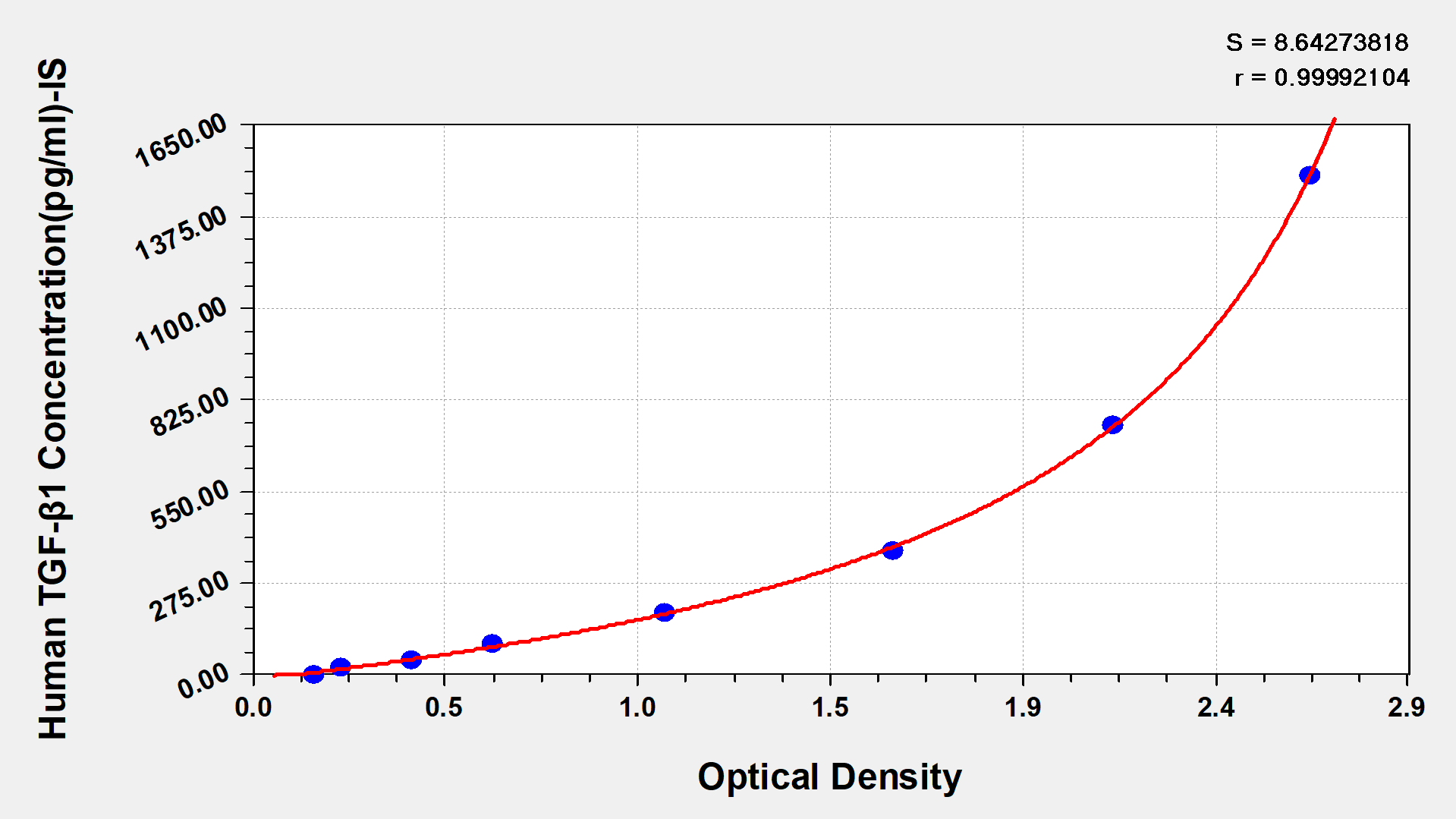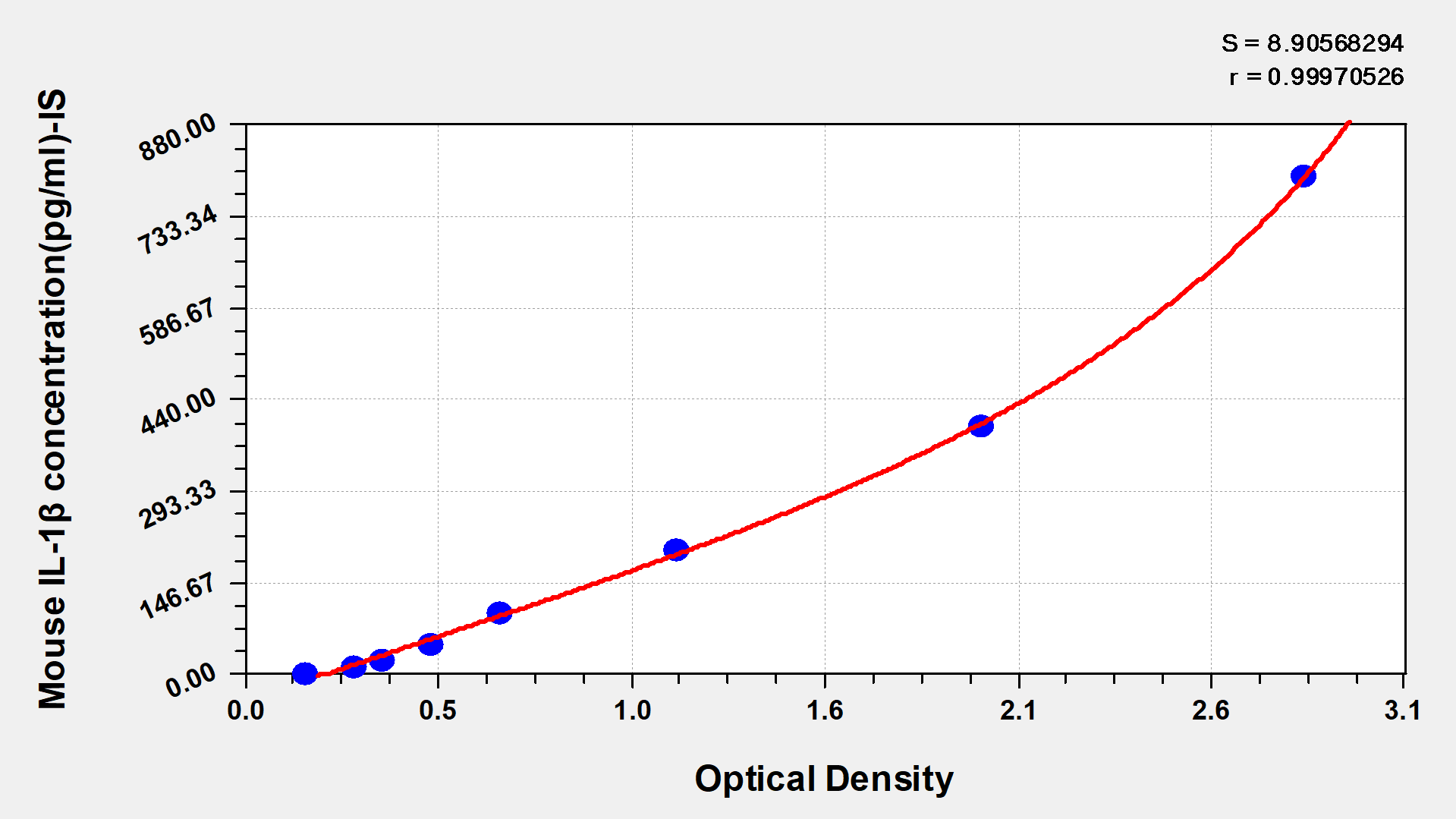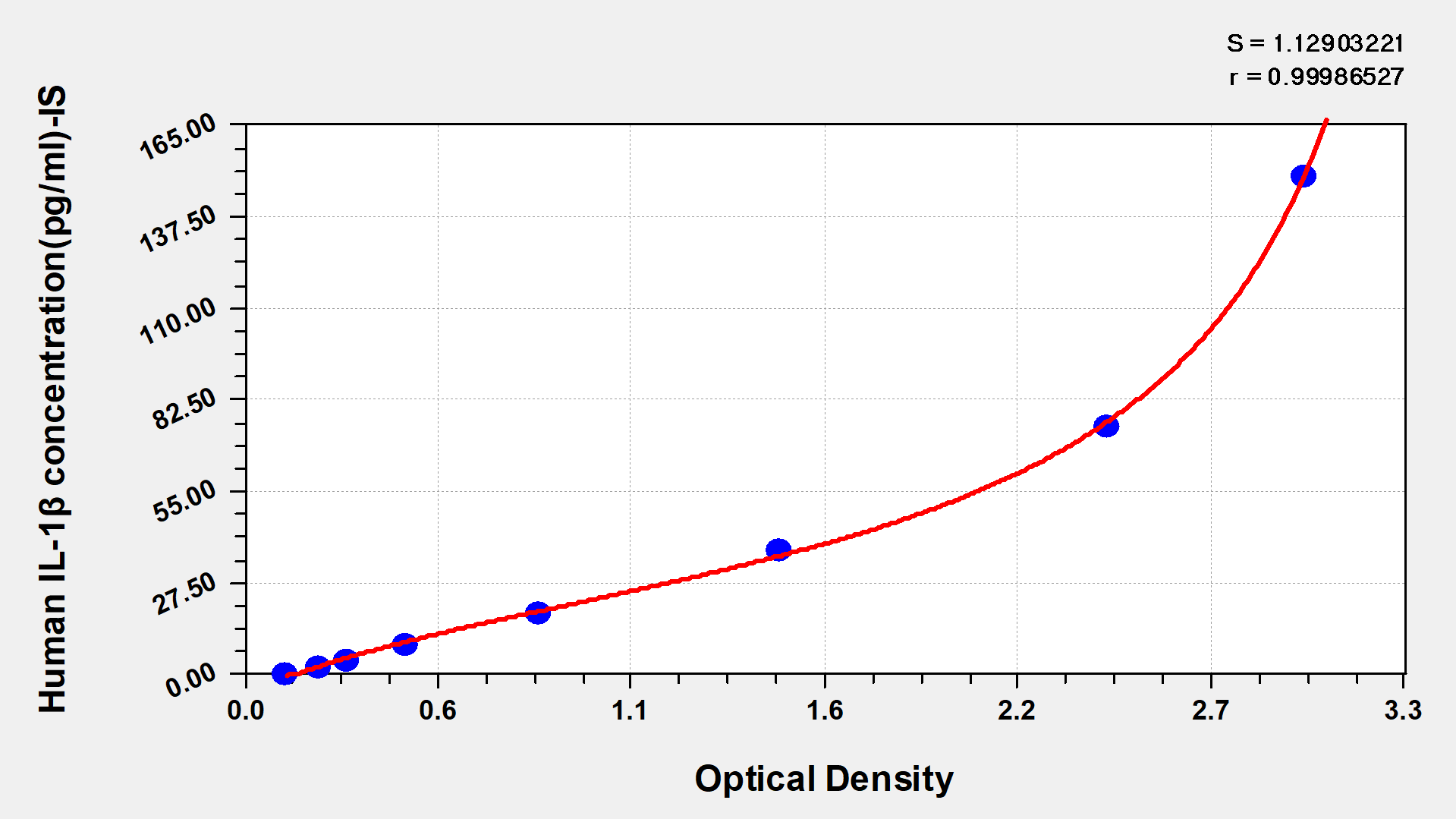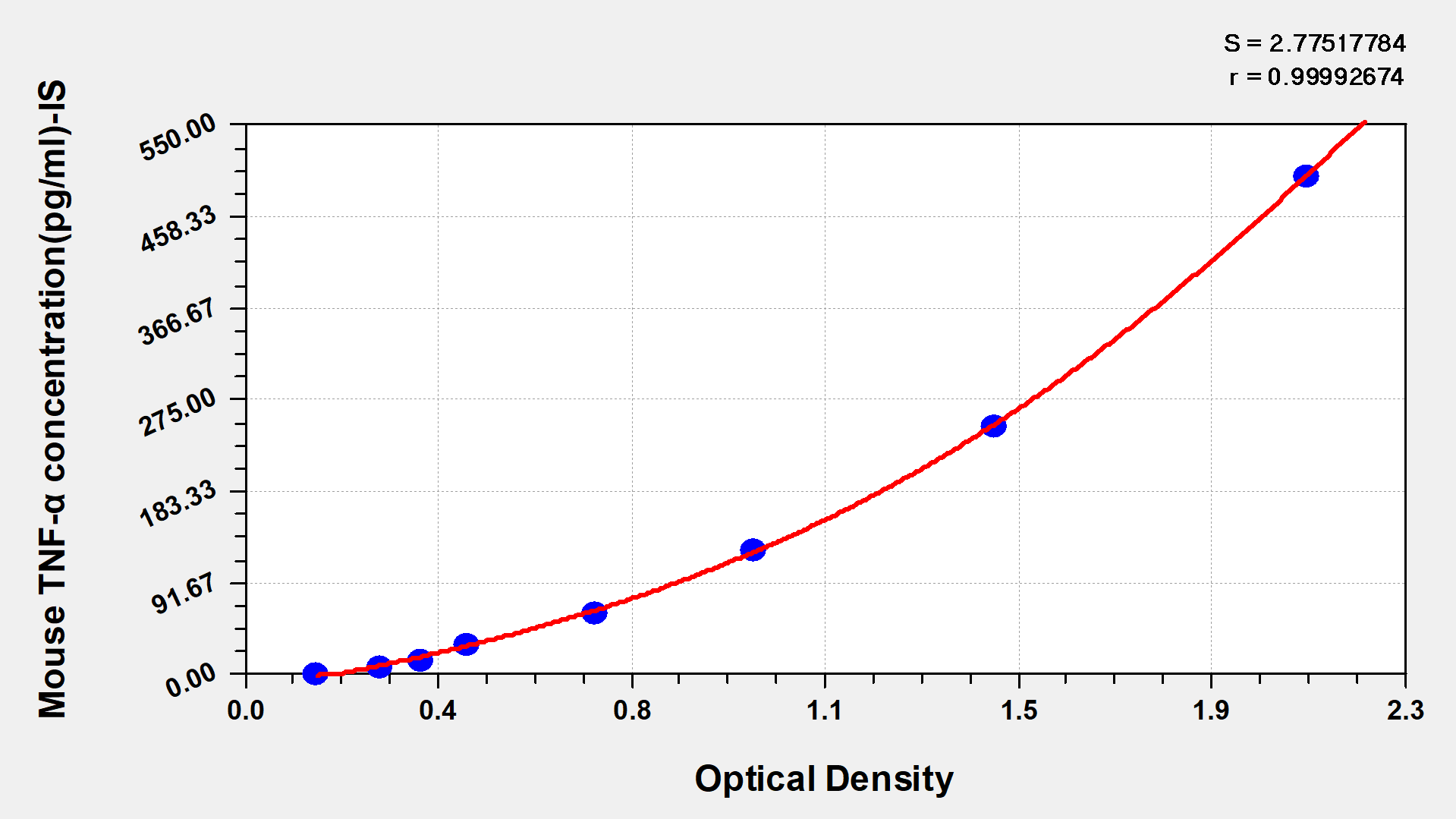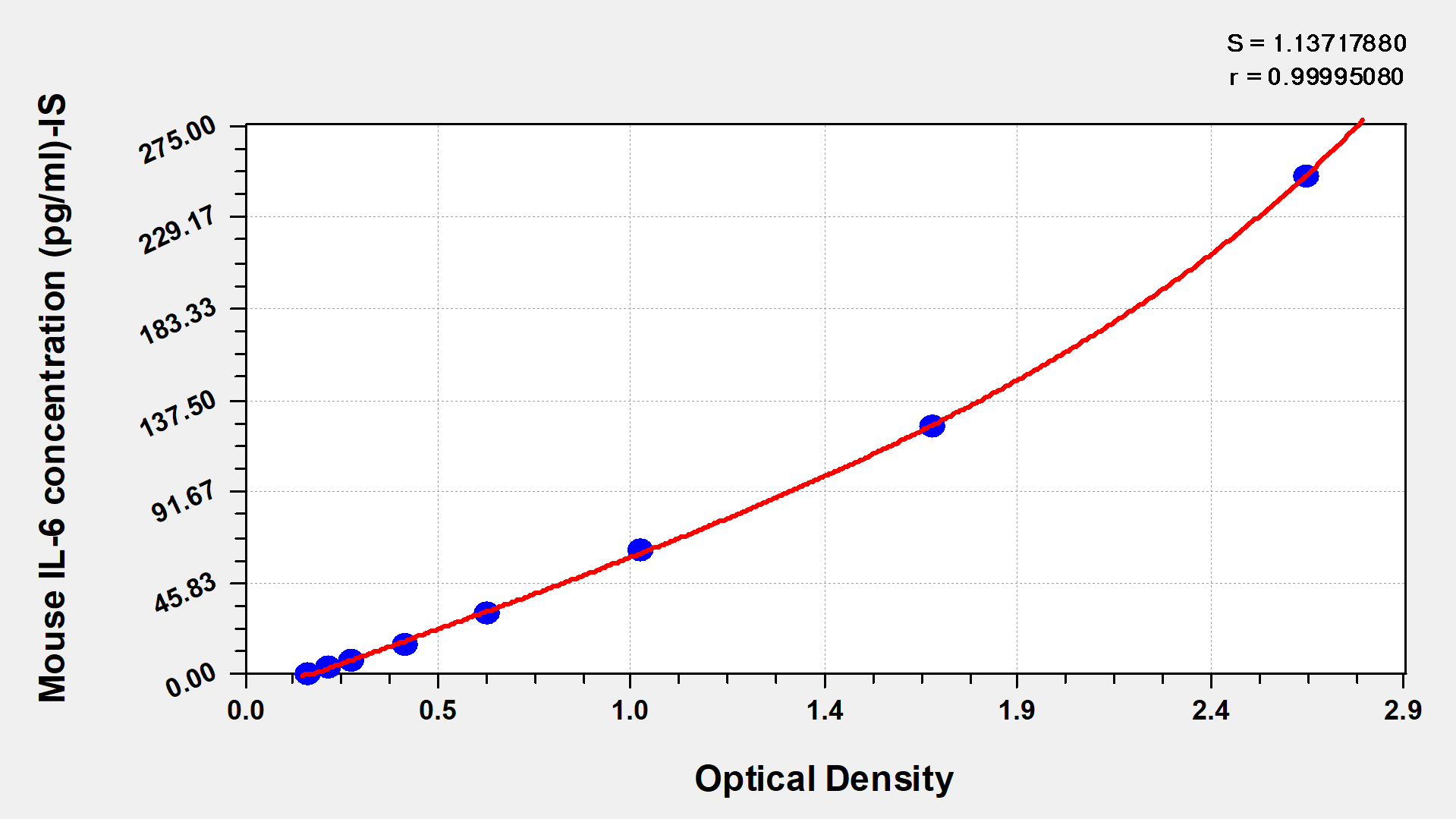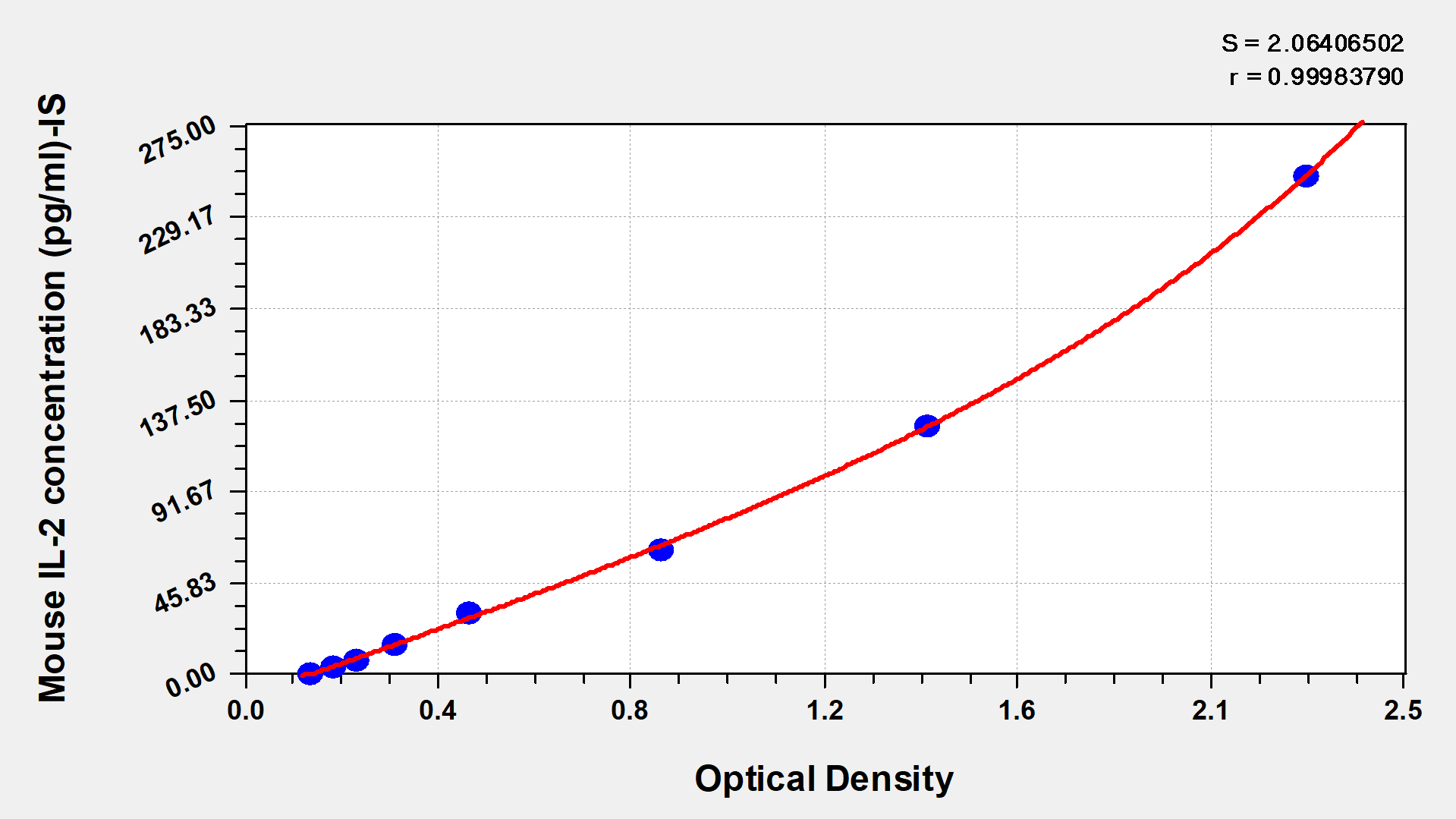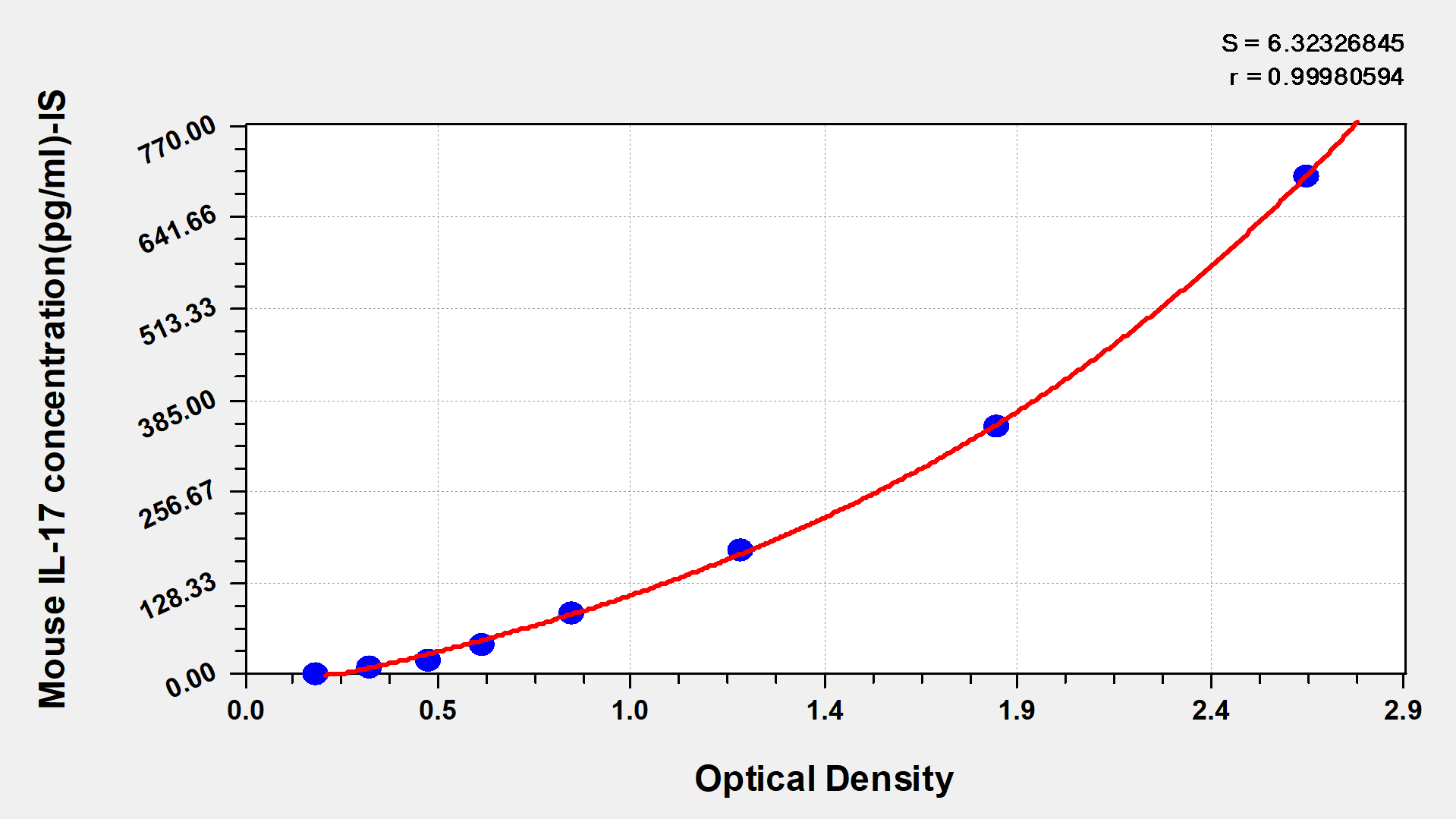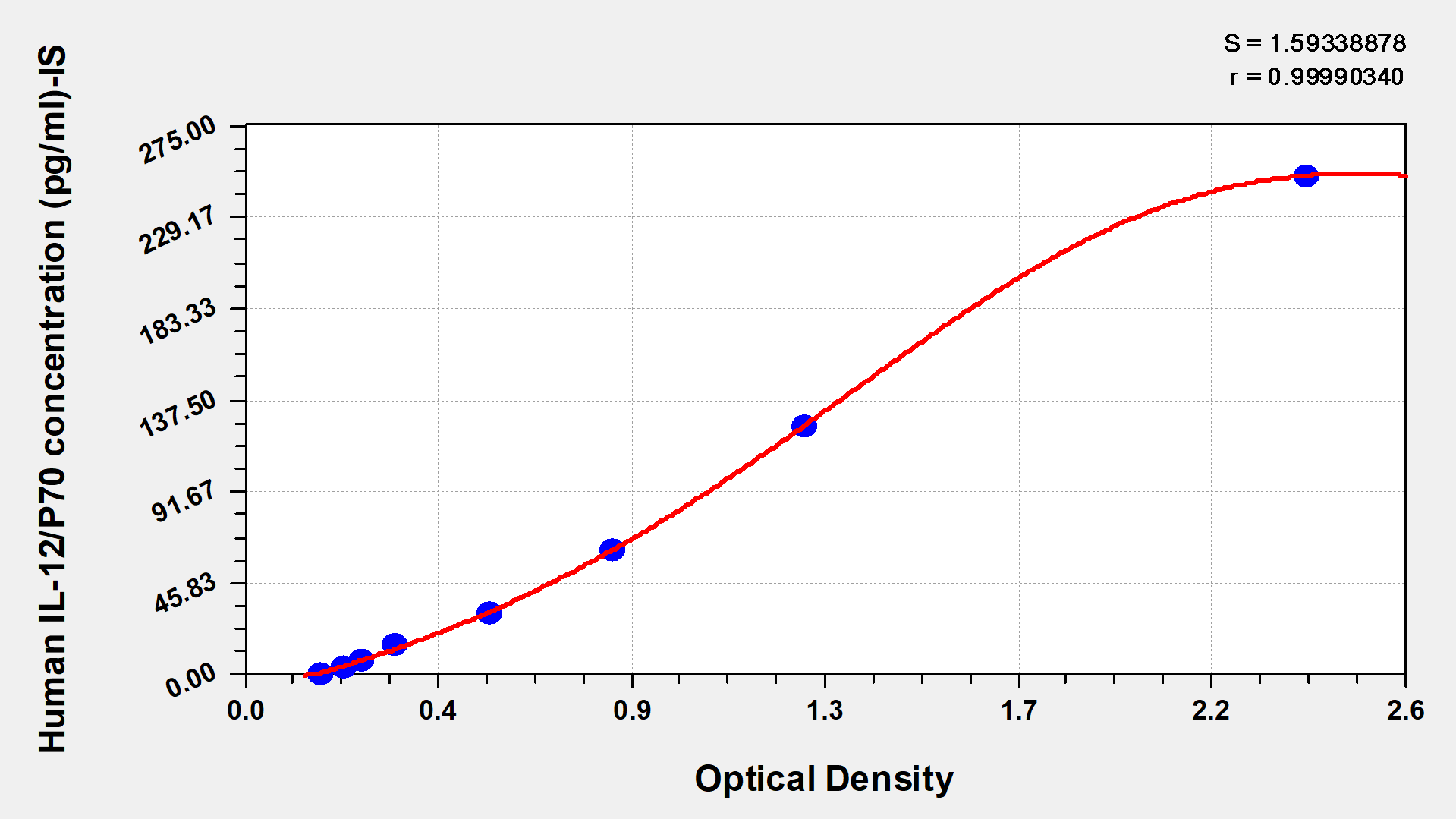Mouse Macrophage Migration Inhibitory Factor,MIF ELISA Kit
-
中文名称:小鼠巨噬细胞移动抑制因子(MIF)酶联免疫试剂盒
-
货号:CSB-E07292m
-
规格:96T/48T
-
价格:¥3200/¥2500
-
其他:
产品详情
-
产品描述:CUSABIO小鼠巨噬细胞移动抑制因子(MIF)定量检测专用酶联免疫试剂盒(货号:CSB-E07292m),采用双抗体夹心法原理,可精准检测血清、血浆及组织匀浆样本中的MIF蛋白浓度。MIF作为关键的促炎细胞因子,在调控巨噬细胞活化、炎症反应及免疫调节中发挥重要作用,其异常表达与多种病理生理过程密切相关。试剂盒检测范围为125-8000皮克/毫升(换算为0.125-8纳克/毫升),通过预包被特异性抗体实现目标蛋白的高灵敏度捕获,配合标记抗体完成信号放大检测,实验流程标准化且重复性良好。适用于基础医学研究中炎症机制探索、免疫调控实验验证,以及心血管疾病、代谢综合征等动物模型的生物标志物分析,可广泛用于药物开发过程中抗炎化合物或免疫调节剂的体外效果评估。该试剂盒操作全程约需4-5小时,配套提供完整标准品和优化缓冲液体系,支持常规酶标仪在450nm波长下进行读数分析,为科研工作者提供稳定可靠的定量检测方案。
-
别名:MifMacrophage migration inhibitory factor ELISA Kit; MIF ELISA Kit; EC 5.3.2.1 ELISA Kit; Delayed early response protein 6 ELISA Kit; DER6 ELISA Kit; Glycosylation-inhibiting factor ELISA Kit; GIF ELISA Kit; L-dopachrome isomerase ELISA Kit; L-dopachrome tautomerase ELISA Kit; EC 5.3.3.12 ELISA Kit; Phenylpyruvate tautomerase ELISA Kit
-
缩写:
-
Uniprot No.:
-
种属:Mus musculus (Mouse)
-
样本类型:serum, plasma, tissue homogenates
-
检测范围:125 pg/ml - 8000 pg/ml
-
灵敏度:31.25 pg/ml
-
反应时间:1-5h
-
样本体积:50-100ul
-
检测波长:450 nm
-
研究领域:Immunology
-
测定原理:quantitative
-
测定方法:Sandwich
-
精密度:
Intra-assay Precision (Precision within an assay): CV%<8%
Three samples of known concentration were tested twenty times on one plate to assess.
Inter-assay Precision (Precision between assays): CV%<10%
Three samples of known concentration were tested in twenty assays to assess.
-
线性度:
To assess the linearity of the assay, samples were spiked with high concentrations of mouse MIF in various matrices and diluted with the Sample Diluent to produce samples with values within the dynamic range of the assay.
Sample
Serum(n=4)
1:1
Average %
100
Range %
95-105
1:2
Average %
97
Range %
91-105
1:4
Average %
97
Range %
92-107
1:8
Average %
92
Range %
86-98
-
回收率:
The recovery of mouse MIF spiked to levels throughout the range of the assay in various matrices was evaluated. Samples were diluted prior to assay as directed in the Sample Preparation section.
Sample Type
Average % Recovery
Range
Serum (n=5)
102
99-110
EDTA plasma (n=4)
97
90-106
-
标准曲线:
These standard curves are provided for demonstration only. A standard curve should be generated for each set of samples assayed.

pg/ml
OD1
OD2
Average
Corrected
8000
2.326
2.434
2.380
2.212
4000
1.818
1.767
1.793
1.625
2000
1.243
1.228
1.236
1.068
1000
0.759
0.729
0.744
0.576
500
0.417
0.421
0.419
0.251
250
0.327
0.333
0.330
0.162
125
0.263
0.274
0.269
0.101
0
0.171
0.165
0.168
-
数据处理:
-
货期:3-5 working days
相关产品
靶点详情
-
最新研究进展:MIF是一种促炎症因子,全名为迁移抑制因子。它参与免疫反应、炎症反应、细胞增殖等多种生理过程,在多种疾病的发生和发展中发挥重要作用。最近的研究表明,MIF与肿瘤、炎症性疾病、自身免疫性疾病等多种疾病的发生和发展密切相关。
-
功能:Pro-inflammatory cytokine. Involved in the innate immune response to bacterial pathogens. The expression of MIF at sites of inflammation suggests a role as mediator in regulating the function of macrophages in host defense. Counteracts the anti-inflammatory activity of glucocorticoids. Has phenylpyruvate tautomerase and dopachrome tautomerase activity (in vitro), but the physiological substrate is not known. It is not clear whether the tautomerase activity has any physiological relevance, and whether it is important for cytokine activity.
-
基因功能参考文献:
- MIF mediates LPS-induced cardiac dysfunction in murine cardiomyocytes, which was attenuated by MIF knockout. PMID: 29350381
- MIF attenuates oxygen-glucose deprivation-induced cochlear cells injury. MIF enhances Nrf2 and inhibit oxidative stress in cochlear cells. Enhanced Akt-Nrf2-HO-1 pathway may mediate cochlear protection by MIF. PMID: 29908183
- Data indicate function of macrophage migration inhibitory factor (MIF) as a regulator of the NLR family pyrin domain containing 3 (NLRP3) inflammasome complex in macrophages. PMID: 29884801
- that macrophage migration inhibitory factor directly engages in dengue NS1-induced glycocalyx degradation and that targeting MIF may represent a possible therapeutic approach for preventing dengue-induced vascular leakage PMID: 29702687
- our data suggests a model in which MIF expression in the primary tumor dampens the anti-tumor immune response, promoting tumor growth PMID: 29864117
- MIF knockdown significantly accentuates hearing loss in young mice. PMID: 28990052
- Mif mediates PAR4-induced bladder pain through urothelial HMGB1. PMID: 29263120
- These results show although high systemic levels of MIF contribute to the development of type 2 diabetes mellitus pathology. PMID: 28780379
- High MIF expression is associated with progressive multiple sclerosis. PMID: 28923927
- The lack of MIF leads to disturbances of systemic and hippocampal insulin sensitivity, which are possibly responsible for memory deficits and anxiety, most likely through decreased PSA-NCAM-mediated neuroplasticity rather than through neurotrophic factors. PMID: 28919555
- These data indicate the functional role of the MIF-COX-p53 axis in inflammation and cancer at the genomic and proteomic levels in COX-2-ablated cells. PMID: 29247872
- Our results showed that MIF regulates MCP-1 expression in hepatocytes of injured liver via CD74, CD44, and p38 MAPK in an autocrine manner. PMID: 27273604
- MIF is involved in the pathogenesis of AF, probably by down-regulating the protein and gene expression of Cx43 via ERK1/2 kinase activation PMID: 28429502
- Endogenous MIF reduces the accumulation and toxicity of misfolded SOD1 in a mouse model of amyotrophic lateral sclerosis. PMID: 27551074
- Gene expression of MIF was 30-fold higher in the heart, compared to skeletal muscle and protein expression of MIF was 3-fold higher in the heart compared to skeletal muscle. PMID: 27364992
- renal tubular MIF is an endogenous renoprotective factor in progressive kidney diseases PMID: 28801314
- locally produced MIF in the inflammatory bone lytic site is engaged in the chemoattraction of circulating CXCR4+ osteoclast precursor cells. PMID: 27082509
- MIF expression was induced in chondrocytes of tissue-engineered cartilage, and could exert a profound effect on chondrocytes by promoting cartilage maturation. MIF could also regulate the phenotype of surrounding macrophages, impairing the maturation of transplanted tissues. PMID: 28574571
- pretreatment of P. aeruginosa with rMIF is associated with reduced bacterial killing by tobramycin. PMID: 28768722
- loss of autophagy, by pharmacological inhibition or siRNA silencing of Atg5, enhances MIF secretion by monocytes and macrophages. PMID: 27163877
- CHD7 is an important factor in the proliferation and stemness maintenance of neural stem/progenitor cells. PMID: 27955690
- MIF-deficient mice have reduced Nippostrongylus brasiliensis burden and mounted an enhanced type 2 immune response, including increased Gata3 expression and interleukin-13 production in the mesenteric lymph nodes PMID: 27049059
- Sertoli cells to produce MIF under normal conditions. MIFR is expressed in GFRalpha1 and Sertoli cells. MIF induced spermatogonial cell migration PMID: 27925200
- MIF-transgenic cells exhibited substantially decreased levels of p53 after hyperthermia treatment compared with WT and MIF-knockout cells PMID: 27528627
- This study showed that loss of keratinocyte-derived MIF leads to a loss of control of epithelial skin tumor formation in chemical skin carcinogenesis, which highlights an unexpected tumor-suppressive activity of MIF in murine skin. PMID: 27825106
- This study was undertaken to investigate the potential role of Macrophage migration inhibitory factor in osteoarthritis in human joint tissues and in vivo in mice with age-related and surgically induced osteoarthritis PMID: 27564840
- MIF (macrophage migrating inhibitory factor), a potential pathogenic molecule in African trypanosomosis, was found herein to promote erythrophagocytosis, to block extramedullary erythropoiesis and RBC maturation, and to trigger hemodilution. PMID: 27632207
- findings suggest that macrophage migration inhibitory factor regulates extramedullary erythropoiesis by inhibiting an overexpansion of splenic immature erythroid cells during chronic stress and indicate a novel role for this cytokine under chronic stress conditions PMID: 27129368
- Findings suggest that Mif plays a role in the molecular mechanisms of macrophage and dendritic cell activation and drives T cell responses involved in the pathology of type 1 diabetes mellitus. PMID: 27699180
- MIF has a potential role in pathological angiogenesis of proliferative retinopathy. PMID: 28070752
- genetic Mif deletion reduces the incidence and severity of oral carcinogenesis, by inhibiting the expression of chronic pro-inflammatory immune mediators. Thus, targeting MIF is a promising strategy for the prevention or therapy of oral cancer. PMID: 27164411
- MIF inhibits the myoblast differentiation by affecting the cell cycle progression, but does not affect proliferation. PMID: 26927414
- this paper shows that the detrimental effect of MIF knockout was associated with accentuated loss in cardiac autophagy with aging PMID: 26940544
- our results suggest that MIF promotes mCSC survival, proliferation and endothelial differentiation through the activation of the PI3K/Akt/mTOR and AMPK signaling pathways. PMID: 27035848
- Posttranslational modification of MIF by S-nitrosation results in intracellular accumulation and protection from myocardial ischemia reperfusion injury. PMID: 26310191
- Data show that the siRNA-induced macrophage migration inhibitory factor (MIF) reduction in murine mammary cancer line 4T1 and human breast cancer line MDA-MB-231 resulted in significant reduction of cell proliferation and increase of apoptosis. PMID: 26403072
- High expression levels of macrophage migration inhibitory factor sustain the innate immune responses of neonates. PMID: 26858459
- The deletion of the MIF gene led to reduced behavioural despair in mice of both sexes and IFN-gamma mRNA levels were reduced in the hippocampus of the MIF KO mice. PMID: 26338025
- In D-galactosamine-sensitized mice CP+Cu(II) increased the LPS-induced lethality from 54 to 100%, while administration of antibodies against MIF prevented the lethal effect. The enhancement by CP+Cu(II) of the pro-inflammatory signal of MIF is discussed. PMID: 26091949
- data suggest that the MIF-Notch axis may play an important role in the pathogenesis of experimental autoimmune uveitis PMID: 26400205
- The functional role of MIF in cell recruitment was investigated by a chemotaxis assay and by flow cytometry of labeled macrophages that were injected into Mif-/-and wildtype mice PMID: 26348853
- these results implicate MIF in the pathogenesis of esophageal inflammation and suggest that targeting MIF might represent a novel therapy for EoE. PMID: 25712805
- Data suggest that macrophage migration inhibitory factor (MIF) inhibition could be a promising approach to the treatment of diabetes mellitus (DM)-associated atherosclerosis (AS). PMID: 25661015
- Bladder PAR activation elicits urothelial MIF release and urothelial MIF receptor signaling at least partly through CXCR4 to result in abdominal hypersensitivity without overt bladder inflammation PMID: 26020638
- Transcription factor MEF2 and Zac1 mediate MIF-induced GLUT4 expression through CD74-dependent AMPK activation in cardiomyocytes PMID: 26455966
- Blockade of CXCR7 suppressed MIF-mediated ERK- and zeta-chain-associated protein kinase (ZAP)-70 activation PMID: 26139098
- Macrophage migration inhibitory factor is detrimental for survival and is associated with lung pathology, inflammatory cellular infiltration, and bacterial replication in a mouse model of pneumococcal pneumonia. PMID: 25943202
- Macrophage migration inhibitory factor may play an important role in recovery from acoustic trauma PMID: 25853607
- data indicate that MIF and CD74 facilitate RANKL-induced osteoclastogenesis, and suggest that MIF contributes directly to bone erosion, as well as inflammation, in rheumatoid arthritis PMID: 25647268
- MIF was found to be a major platelet-derived chemotactic recruitment factor with clot-modulating properties and therefore might be relevant in inflammatory diseases such as atherosclerosis PMID: 25561410
显示更多
收起更多
-
亚细胞定位:Secreted. Cytoplasm.
-
蛋白家族:MIF family
-
数据库链接:
Most popular with customers
-
Human Transforming Growth factor β1,TGF-β1 ELISA kit
Detect Range: 23.5 pg/ml-1500 pg/ml
Sensitivity: 5.8 pg/ml
-
-
-
Mouse Tumor necrosis factor α,TNF-α ELISA Kit
Detect Range: 7.8 pg/ml-500 pg/ml
Sensitivity: 1.95 pg/ml
-
-
-
-



